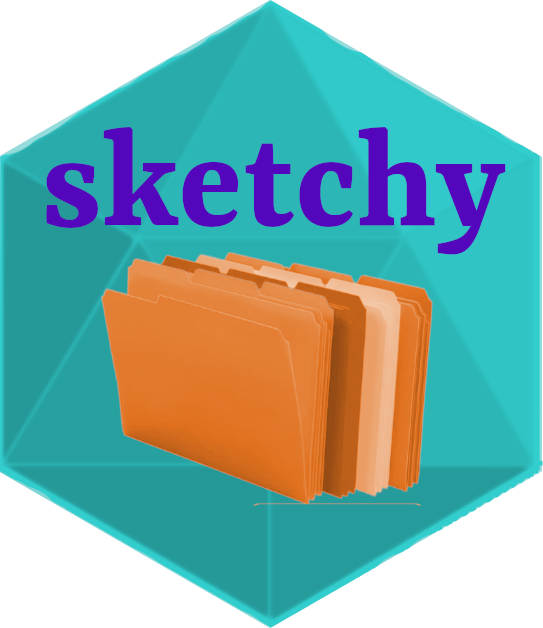


The hardware and bandwidth for this mirror is donated by dogado GmbH, the Webhosting and Full Service-Cloud Provider. Check out our Wordpress Tutorial.
If you wish to report a bug, or if you are interested in having us mirror your free-software or open-source project, please feel free to contact us at mirror[@]dogado.de.

The package is intended to facilitate the use of research compendiums for data analysis in the R environment. Standard research compendiums provide a easily recognizable means for organizing digital materials, allowing other researchers to inspect, reproduce, and build upon that research.
Unlike other R packages for creating research compendiums (e.g. vertical, rrtools), sketchy isn’t wedded to a particular folder structure. Currently the package provides 14 alternative structures (see object compendiums) and allows users to modify or input their own structures.
To install the latest developmental version from github you will need the R package remotes:
Compendiums can be set up with the function make_compendium(). The function creates the folder/subfolder structure and prints a diagram of the skeleton in the console:
path = tempdir()
# load data
data(compendiums)
make_compendium(name = "proyect_x", path = path, format = "basic")
## Creating directories ...
## proyect_x
## │
## ├── data/
## │ ├── processed/ # modified/rearranged data
## │ └── raw/ # original data
## ├── manuscript/ # manuscript/poster figures
## ├── output/ # all non-data products of data analysis
## └── scripts/ # code
## Done.
(in these examples the compendiums are created in a temporary directory, change ‘path’ to create it in a different directory)
We can use folder structures from other sources. For instance, in this example we use the structured suggested by Wilson et al. (2017):
make_compendium(name = "proyect_z", path = path, format = "large_compendium")
## Creating directories ...
## proyect_z
## │
## ├── analysis/ # Data, scripts, RMarkdown reports and Makefile
## │ ├── data/ # Raw data in open formats, not changed once created
## │ └── scripts/ # R code used to analyse and visualise data
## ├── man/ # Auto-generated documentation for the custom R functions
## ├── R/ # Custom R functions used repeatedly throughout the project
## └── tests/ # Unit tests of R functions to ensure they perform as expected
## Done.
When creating a compendium that includes a “manuscript” folder the package adds a “manuscript_template.Rmd” file for facilitating paper writing within the compendium itself.
We can check all compendium structure available as follows:
for (i in 1:length(compendiums)) {
print("---------------", quote = FALSE)
print(names(compendiums)[i], quote = FALSE)
print_skeleton(folders = compendiums[[i]]$skeleton)
}
## [1] ---------------
## [1] basic
## .
## │
## ├── data/
## │ ├── processed/
## │ └── raw/
## ├── manuscript/
## ├── output/
## └── scripts/
## [1] ---------------
## [1] figures
## .
## │
## ├── data/
## │ ├── processed/
## │ └── raw/
## ├── manuscript/
## ├── output/
## │ └── figures/
## │ ├── exploratory/
## │ └── final/
## └── scripts/
## [1] ---------------
## [1] project_template
## .
## │
## ├── cache/
## ├── config/
## ├── data/
## ├── diagnostics/
## ├── docs/
## ├── graphs/
## ├── lib/
## ├── logs/
## ├── munge/
## ├── profiling/
## ├── reports/
## ├── src/
## └── tests/
## [1] ---------------
## [1] pakillo
## .
## │
## ├── analyses/
## ├── data/
## ├── data-raw/
## ├── docs/
## ├── inst/
## ├── man/
## ├── manuscript/
## ├── R/
## └── tests/
## [1] ---------------
## [1] boettiger
## .
## │
## ├── man/
## ├── R/
## ├── tests/
## └── vignettes/
## [1] ---------------
## [1] wilson
## .
## │
## ├── data/
## ├── doc/
## ├── requirements/
## ├── results/
## └── src/
## [1] ---------------
## [1] small_compendium
## .
## │
## ├── analysis/
## └── data/
## [1] ---------------
## [1] medium_compendium
## .
## │
## ├── analysis/
## ├── data/
## ├── man/
## └── R/
## [1] ---------------
## [1] large_compendium
## .
## │
## ├── analysis/
## │ ├── data/
## │ └── scripts/
## ├── man/
## ├── R/
## └── tests/
## [1] ---------------
## [1] vertical
## .
## │
## ├── data/
## ├── data-raw/
## ├── docs/
## ├── experiments/
## ├── man/
## ├── manuscripts/
## ├── model/
## ├── posters/
## ├── R/
## ├── slides/
## └── vignettes/
## [1] ---------------
## [1] rrtools
## .
## │
## ├── analysis/
## ├── data/
## ├── figures/
## ├── paper/
## └── templates/
## [1] ---------------
## [1] rdir
## .
## │
## ├── code/
## │ ├── processed/
## │ └── raw/
## ├── data/
## │ ├── clean/
## │ └── raw/
## ├── figures/
## │ ├── exploratory/
## │ └── final/
## └── text/
## ├── final/
## └── notes/
## [1] ---------------
## [1] workflowr
## .
## │
## ├── analysis/
## ├── code/
## ├── data/
## ├── docs/
## └── output/
## [1] ---------------
## [1] sketchy
## .
## │
## ├── data/
## │ ├── processed/
## │ └── raw/
## ├── manuscript/
## ├── output/
## └── scripts/Please cite sketchy as follows:
Araya-Salas, M., Willink, B., Arriaga, A. (2020), sketchy: research compendiums for data analysis in R. R package version 1.0.0.
Alston, J., & Rick, J. (2020). A Beginner’s Guide to Conducting Reproducible Research.
Marwick, B., Boettiger, C., & Mullen, L. (2018). Packaging Data Analytical Work Reproducibly Using R (and Friends). American Statistician, 72(1), 80–88.
Wilson G, Bryan J, Cranston K, Kitzes J, Nederbragt L. & Teal, T. K.. 2017. Good enough practices in scientific computing. PLOS Computational Biology 13(6): e1005510.
These binaries (installable software) and packages are in development.
They may not be fully stable and should be used with caution. We make no claims about them.
Health stats visible at Monitor.